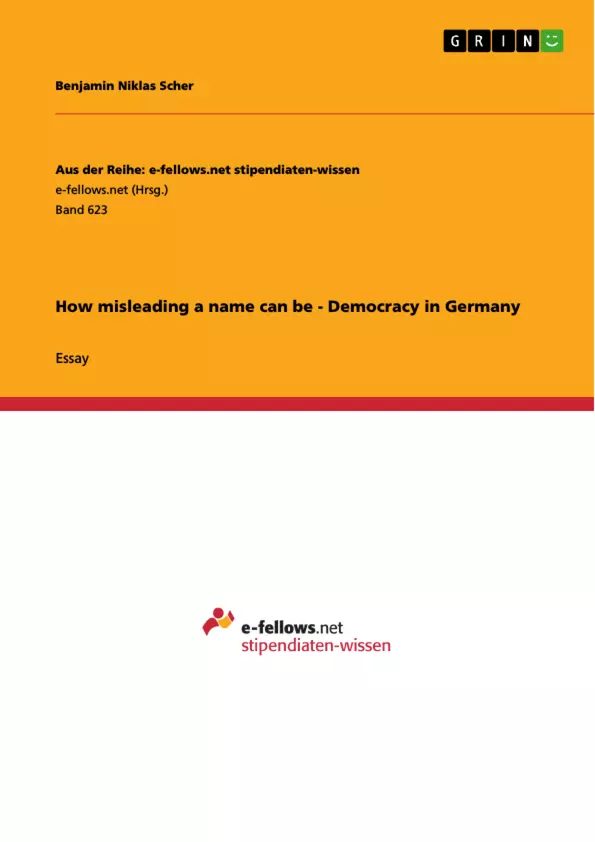Bogaards identifies two broad possibilities how to capture a regime change. Either “[…] through a change of scores on a scale or index of democracy.” or “Trough a change of categories. These categories can come directly from categorical coding schemes or can be derived indirectly from scores.” (Bogaards, 2010) This paper compares two of those measures, namely National Elections across Democracy and Autocracy (NELDA) and Freedom House. These two will be subject to a cross-comparison with the case study of Germany.
Nelda is an almost exclusively dichotomous measure which is set up out of 58 questions concerned with the election procedure of a country. 55 measures are yes-no questions, hence dichotomous while three allow free-text answers. Nelda’s country selection follows the List of Independent States by Gleditsch and Ward. NELDA draws it’s out of a secondary data analysis of a variety of sources, including data handbooks for the specific regions and several official reports. (A full list of sources can be found at http://hyde.research.yale.edu/nelda/#sources)(Hyde & Marinov, 2012) For our purpose we only consider three variables out of the 58, namely Nelda 3 to 5 which measure whether opposition is allowed, whether more than one party was legal, and whether there was a choice of candidates on the ballot.
Freedom house is a NGO that conducts research on democracy, political freedom and human rights. Their most important annual publication is the Freedom in the World Report. (Freedom House, 2012) It measures Political right and civil liberty with a total of 25 questions using a continuous scale from four to zero. The results are transformed in a fixed mathematical procedure and countries are ranked in an again continuous final scale between one (most free) and seven (not free) in each category. After Combining the results countries are finally ranked as not free (5.5-7), partly free (3-5), or free (1-2.5). (Freedom House, 2012) It is important to notice that Freedom house as the name implies primarily is a measure of freedom - not democracy. However democracy is one part of the Freedom house analysis. To be considered as an electoral democracy a country only has to fulfill four criteria: A political system that allows for a plurality of parties and competition in between them, fair voting rights, secret, fair and regular elections, and free access to the political field and campaigning. (Bogaards, 2012)
Inhaltsverzeichnis (Table of Contents)
- Main Body
- Two Measures of Democracy Applied to the Two German States
- National Elections across Democracy and Autocracy (NELDA)
- Freedom House
- Comparison of the Two Measures
- Results of the Measures for Both States
- Results from NELDA
- Results from Freedom House
- Comparing the Two Measures
- The Situation in East Germany
- Conclusion
Zielsetzung und Themenschwerpunkte (Objectives and Key Themes)
This paper analyzes the applicability of two measures of democracy, NELDA and Freedom House, to the case study of Germany, particularly focusing on the differences between the Federal Republic of Germany (FRG) and the Democratic Republic of Germany (DRG) before and after reunification. The paper aims to compare these measures' effectiveness in capturing the changes in the political systems of both German states, analyzing the strengths and weaknesses of each measure.- Measuring democracy using NELDA and Freedom House
- Analyzing the application of these measures to the historical development of Germany
- Contrasting the democratic structures of the FRG and the DRG
- Evaluating the consistency and effectiveness of each measure
- Exploring the differences in the timeframes used by NELDA and Freedom House
Zusammenfassung der Kapitel (Chapter Summaries)
The main body of the paper begins by introducing two key measures of democracy, NELDA and Freedom House, discussing their methodologies and application. The paper then delves into the historical context of Germany, outlining the division and reunification of the country. It examines the results of both measures in relation to both West and East Germany, highlighting the contrasting scores and their implications for the democratic nature of each state. The paper then analyzes the consistency and effectiveness of both measures, discussing their strengths and weaknesses in the context of Germany. The final chapter draws conclusions about the applicability and limitations of NELDA and Freedom House for measuring democracy, particularly in cases of dramatic political change.
Schlüsselwörter (Keywords)
This paper focuses on the crucial concepts of democracy, political systems, and regime change. It delves into specific measures of democracy, such as NELDA and Freedom House, while examining their application to the case study of Germany. The paper explores the evolution of democratic structures in West and East Germany, highlighting the differences in their political systems. Important themes explored include the role of elections, freedom of expression, and political rights in shaping and measuring democracy.Frequently Asked Questions
What is the difference between NELDA and Freedom House?
NELDA is a dichotomous measure focusing on election procedures through 58 questions, while Freedom House uses a continuous scale to measure political rights and civil liberties.
How does Freedom House rank countries?
Countries are ranked on a scale from 1 (most free) to 7 (not free) and then categorized as "Free," "Partly Free," or "Not Free."
What were the findings regarding East Germany (DRG)?
The paper contrasts the scores of the FRG and the DRG before reunification, analyzing how each measure captured the lack of democratic plurality in the East.
What criteria does Freedom House use for an "electoral democracy"?
A country must have a plurality of parties, fair voting rights, secret and regular elections, and free access to political campaigning.
Why is the name "Democracy in Germany" considered misleading?
The title refers to the complexity of measuring democracy in a country that was divided into two states with vastly different political systems (FRG and DRG).
- Quote paper
- Benjamin Niklas Scher (Author), 2012, How misleading a name can be - Democracy in Germany, Munich, GRIN Verlag, https://www.grin.com/document/208438



